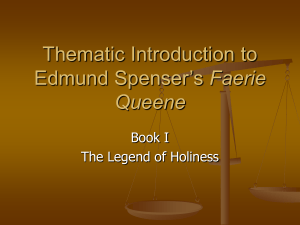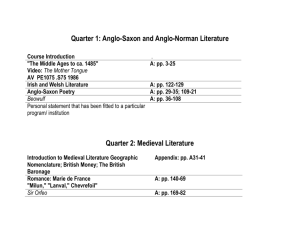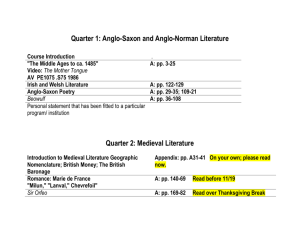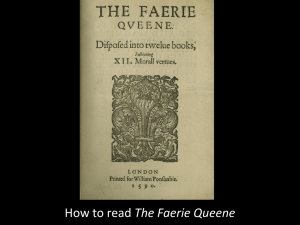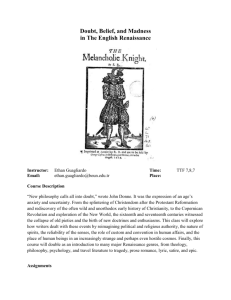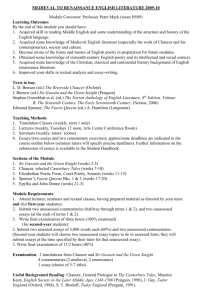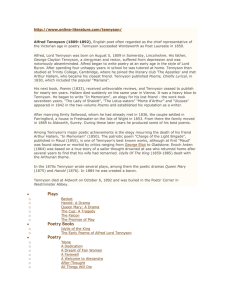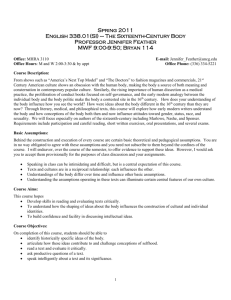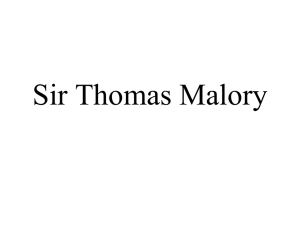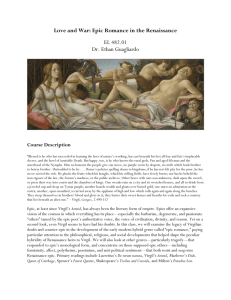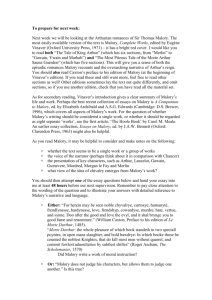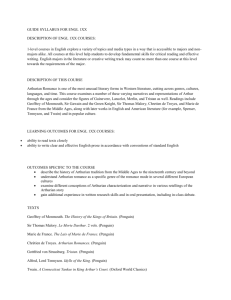Syllabus
advertisement
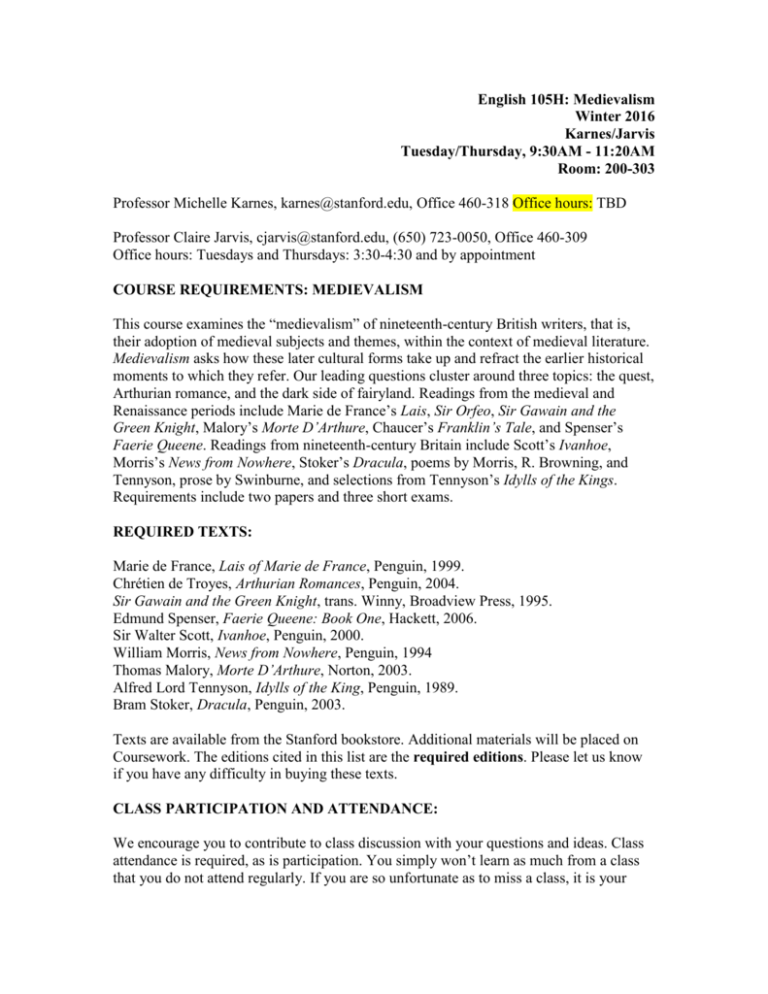
English 105H: Medievalism Winter 2016 Karnes/Jarvis Tuesday/Thursday, 9:30AM - 11:20AM Room: 200-303 Professor Michelle Karnes, karnes@stanford.edu, Office 460-318 Office hours: TBD Professor Claire Jarvis, cjarvis@stanford.edu, (650) 723-0050, Office 460-309 Office hours: Tuesdays and Thursdays: 3:30-4:30 and by appointment COURSE REQUIREMENTS: MEDIEVALISM This course examines the “medievalism” of nineteenth-century British writers, that is, their adoption of medieval subjects and themes, within the context of medieval literature. Medievalism asks how these later cultural forms take up and refract the earlier historical moments to which they refer. Our leading questions cluster around three topics: the quest, Arthurian romance, and the dark side of fairyland. Readings from the medieval and Renaissance periods include Marie de France’s Lais, Sir Orfeo, Sir Gawain and the Green Knight, Malory’s Morte D’Arthure, Chaucer’s Franklin’s Tale, and Spenser’s Faerie Queene. Readings from nineteenth-century Britain include Scott’s Ivanhoe, Morris’s News from Nowhere, Stoker’s Dracula, poems by Morris, R. Browning, and Tennyson, prose by Swinburne, and selections from Tennyson’s Idylls of the Kings. Requirements include two papers and three short exams. REQUIRED TEXTS: Marie de France, Lais of Marie de France, Penguin, 1999. Chrétien de Troyes, Arthurian Romances, Penguin, 2004. Sir Gawain and the Green Knight, trans. Winny, Broadview Press, 1995. Edmund Spenser, Faerie Queene: Book One, Hackett, 2006. Sir Walter Scott, Ivanhoe, Penguin, 2000. William Morris, News from Nowhere, Penguin, 1994 Thomas Malory, Morte D’Arthure, Norton, 2003. Alfred Lord Tennyson, Idylls of the King, Penguin, 1989. Bram Stoker, Dracula, Penguin, 2003. Texts are available from the Stanford bookstore. Additional materials will be placed on Coursework. The editions cited in this list are the required editions. Please let us know if you have any difficulty in buying these texts. CLASS PARTICIPATION AND ATTENDANCE: We encourage you to contribute to class discussion with your questions and ideas. Class attendance is required, as is participation. You simply won’t learn as much from a class that you do not attend regularly. If you are so unfortunate as to miss a class, it is your responsibility to learn about and promptly complete any work that was assigned in it. Please show up to class on time as well. Expect absences and tardiness to affect your grade adversely. CONSULTATION: We encourage you to come to office hours to talk about course readings, assignments, or other matters relevant to the course. We will also schedule meetings outside my office hours if you are unavailable during them. Short questions are appropriate over email, but please come see us if you have a question that requires more than a 1-2 sentence answer. Do not expect immediate responses to emails: we will respond to all messages that require response within 48 hours. ASSIGNMENTS: The course’s evaluative requirements fit into one of three categories—comment, synthesis and analysis. Comment: This includes attendance and participation. Your presence and active, thoughtful participation are required. Synthesis: There will be three short (30 minute) exams given over the course of the quarter. Each will include some passage identifications and one short essay question. The goal is to give you a chance to synthesize the material we cover and to think across texts. Analysis: You will write two papers during the course of the quarter, one short (4-5 page) paper and one longer (6-7 pages) paper. The first focuses on a close reading of a single text while the second requires an argumentative claim about one or more texts. For the second essay, you will be asked to produce an original, analytic argument about the text(s) under discussion. GRADES: Your final grade will be determined by the sum of your work. Keep all of your work throughout the quarter. Participation 15% Close-reading paper 25% Second paper 30% 3 Short Exams 30% (or 10% each) STUDENTS WITH DOCUMENTED DISABILITIES Students who may need an academic accommodation based on the impact of a disability must initiate the request with the Student Disability Resource Center (SDRC) located within the Office of Accessible Education (OAE). SDRC staff will evaluate the request with required documentation, recommend reasonable accommodations, and prepare an Accommodation Letter for faculty dated in the current quarter in which the request is being made. Students should contact the SDRC as soon as possible since timely notice is needed to coordinate accommodations. The OAE is located at 563 Salvatierra Walk (phone: 723- 1066, 723-1067 TTY). HONOR CODE All students must observe the Honor Code: http://www.stanford.edu/dept/vpsa/judicialaffairs/guiding/honorcode.htm SYLLABUS: MEDIEVALISM I. Romance T, 1/5 Introduction Th, 1/7 Chrétien de Troyes, Lancelot Tennyson, “Lady of Shalott” (Coursework, henceforth CW) T, 1/12 Chrétien de Troyes, Lancelot Marie de France, “Lanval” Th, 1/14 Library Visit T, 1/19 Th, 1/21 Chaucer, Franklin’s Tale (CW) Scott, Ivanhoe (Volume 1) Browning, “Childe Roland to the Dark Tower Came,” (CW) T, 1/26 Scott, Ivanhoe (Volume 2) Th, 1/28 Scott, Ivanhoe (Volume 3) Sir Gawain and the Green Knight T, 2/2 Test 1 Sir Gawain and the Green Knight II. Arthurian Literature Th, 2/4 Malory, Morte D’Arthure, Sir Launcelot and Quene Gwenyvere, pp. 588-645. Morris, “Defence of Guenevere,” CW) Paper due (4-5 pgs.) T, 2/9 Malory, Morte D’Arthure. No new reading. Tennyson, Idylls of the King, Lancelot and Elaine Th, 2/11 Malory, Morte D’Arthure, The Deth of Arthur, pp. 646-698 Tennyson, Idylls of the King, Merlin and Vivien. T, 2/16 Spenser, Faerie Queene, Book 1, Cantos 1-4 Th, 2/18 Spenser, Faerie Queene, Book 1, Cantos 5-8 T, 2/23 Spenser, Faerie Queene, Book 1, Cantos 9-12 Th, 2/25 Morris, News from Nowhere. Chapters 22-32 Swinburne, excerpts from “Under the Microscope” (CW), Ruskin “The Lamp of Light” (CW) Test 2 III. The Dark side of Fairyland Th, 3/2 Sir Orfeo. Ovid, “Orpheus and Eurydice” (CW), Marie de France, “Bisclavret” (CW) Bram Stoker, Dracula (1-64) T, 3/8 Bram Stoker, Dracula (63-307) Th, 3/10 Bram Stoker, Dracula (307-end) Conclusions T, 3/1 Final Exam: Paper Due
